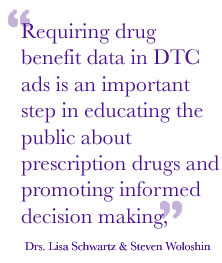
|
For Release: April 28, 2004
Contact: DMS Communications(603) 650-1492
Print Version
Think Inside the "Box" to Increase Understanding of Pharmaceutical Ads
HANOVER, NH--Pharmaceutical ads marketed directly to the consumer may minimize the risks and exaggerate the benefits of medications, often confusing the public about what drugs are most effective, but Dartmouth Medical School (DMS) researchers have found a remedy. The solution, they say, lies in a "prescription drug benefits box," a standardized table on every direct-to-consumer (DTC) ad that would present FDA approval data in clear, easy to understand terms.

Their study, appearing online in Health Affairs, measured the public's reaction to a benefit box that was inserted on three randomly selected DTC ads. The benefit box was modeled after the Food and Drug Administration's (FDA) "Nutrition Facts Box" that appears on food packaging, such as cereal boxes. The box contained information obtained from the clinical trials of each drug that compared the various outcomes of patients who took the drug and those who took a placebo.
More than 200 people were interviewed after they viewed the new ads in an effort to gauge their level of understanding and whether they thought the ads would be helpful. The researchers found strong support for the benefit box, citing that "more than 90 percent [of respondents] preferred an ad which included the box to the standard version without it."
"Requiring drug benefit data in DTC ads is an important step in educating the public about prescription drugs and promoting informed decision making," said lead authors Drs. Lisa Schwartz and Steven Woloshin, associate professors of medicine and of community and family medicine at DMS.
One concern raised is that participants in the study "were very optimistic about the effectiveness of each study drug" and in each case, these perceptions dropped substantially after seeing the actual data from clinical trials in the benefit box. The study found that when shown a standard ad for one drug, 51 percent of consumers rated the drug as extremely or very effective. When the ad contained a drug benefit box, the rate dropped to just 26 percent.
While the Food and Drug Administration currently requires DTC ads to list information about potential harms, it does not require information regarding drug benefits. "The FDA recently released recommendations to pharmaceutical manufacturers on how to improve the information contained in DTC ads, yet they did not include any provisions for including drug benefit data," said co-author Dr. Gilbert Welch, professor of medicine and of community and family medicine at DMS. "To help consumers make the best decisions they can regarding medications, the FDA needs to mandate that drug benefit data be included in pharmaceutical ads."
The authors, all of whom belong to the Veteran Affairs Outcomes Group in White River Junction, Vermont, point out that DTC drug advertising has been controversial since its inception with proponents and opponents debating the educational value of the ads and their impact on the physician patient relationship. Recently, the Ministry of Health in New Zealand - the only country besides the US with legal DTC ads - reconsidered its position and is pursuing a ban on such ads.
-DMS-